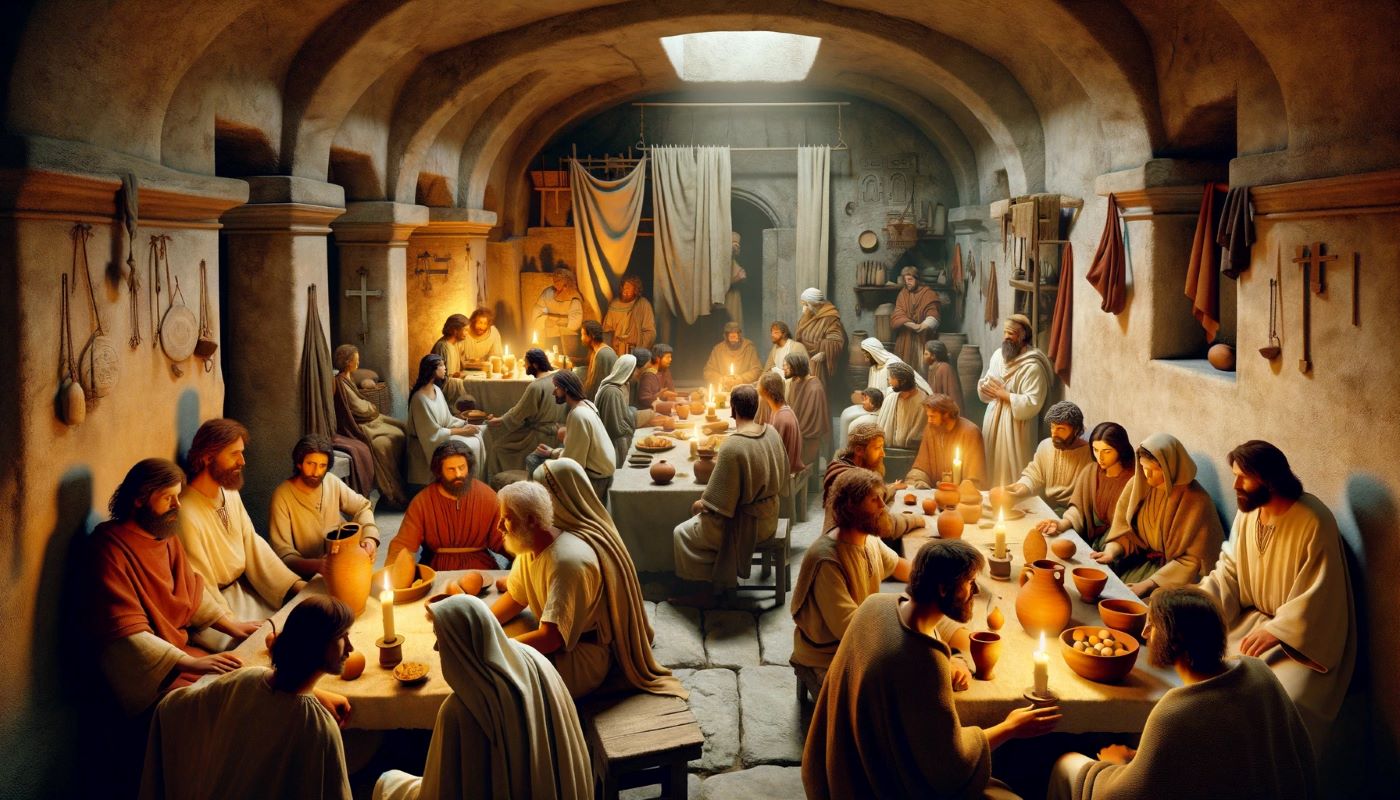Home>Theology and Spirituality>What Is Missionary Baptist Doctrine


Theology and Spirituality
What Is Missionary Baptist Doctrine
Published: February 24, 2024
Peter Smith, Editorial Director at Christian.net, combines deep insights into faith, politics, and culture to lead content creation that resonates widely. Awarded for his contributions to religious discourse, he previously headed a major organization for religious communicators, enhancing dialogue on faith's societal impacts.
Discover the core tenets of Missionary Baptist doctrine and its impact on theology and spirituality. Explore the beliefs and practices that define this influential faith tradition.
(Many of the links in this article redirect to a specific reviewed product. Your purchase of these products through affiliate links helps to generate commission for Christian.net, at no extra cost. Learn more)
Table of Contents
Introduction
Missionary Baptist doctrine is a set of beliefs and practices that form the foundation of the Missionary Baptist Church. This Christian denomination has a rich history and a distinct set of core beliefs that guide its members in their faith and daily lives. Understanding the principles of Missionary Baptist doctrine provides insight into the theological and spiritual perspectives of this vibrant community of believers.
The Missionary Baptist Church traces its roots to the 18th century, emerging in the United States as a result of the Great Awakening, a period of religious revival and fervor. This denomination was deeply influenced by the evangelical fervor of the time, emphasizing the importance of personal conversion and the spread of the Christian faith. As a result, Missionary Baptist doctrine places a strong emphasis on evangelism and missionary work, seeking to share the message of salvation with others.
At the core of Missionary Baptist doctrine are fundamental beliefs that shape the worldview and practices of its adherents. These beliefs are rooted in the authority of the Bible as the inspired word of God, the centrality of Jesus Christ as the savior and redeemer, and the significance of personal faith and commitment to Christ. The Missionary Baptist Church holds to traditional Christian teachings while also embracing the evangelical spirit of spreading the gospel to all nations.
The practices and traditions within Missionary Baptist churches reflect the doctrinal emphasis on personal faith and evangelism. Baptism by immersion, congregational singing, and fervent preaching are integral components of worship services. Additionally, the Missionary Baptist Church places a strong emphasis on community involvement and outreach, seeking to address social and spiritual needs through various ministries and initiatives.
As we delve into the history, core beliefs, practices, and distinctions of Missionary Baptist doctrine, we gain a deeper understanding of the spiritual heritage and theological framework that shapes the identity of this dynamic Christian denomination. Through this exploration, we can appreciate the enduring impact of Missionary Baptist doctrine on the lives of its members and the communities they serve.
Read more: What Are The Duties Of A Baptist Missionary
History of Missionary Baptist Doctrine
The history of Missionary Baptist doctrine is deeply intertwined with the religious landscape of the United States, particularly during the period of the Great Awakening in the 18th century. This movement, characterized by fervent revivals and a renewed emphasis on personal conversion, provided the fertile ground from which the Missionary Baptist Church emerged.
The roots of the Missionary Baptist Church can be traced back to the influence of English and Welsh Baptist traditions that were brought to America by early settlers. These traditions emphasized believer's baptism and the autonomy of local congregations. However, it was during the Great Awakening that the distinctive characteristics of the Missionary Baptist doctrine began to take shape.
The Great Awakening, a period of intense spiritual renewal and evangelistic fervor, had a profound impact on the religious landscape of the American colonies. It was during this time that the Missionary Baptist movement gained momentum, drawing inspiration from the evangelical zeal that characterized the era. The emphasis on personal conversion and the spread of the Christian faith became defining features of Missionary Baptist doctrine.
The missionary zeal of the Missionary Baptist Church was evident in its commitment to spreading the gospel both locally and internationally. This missionary spirit led to the establishment of numerous churches and the expansion of the denomination beyond its original geographic boundaries. The Missionary Baptist Church actively engaged in evangelistic efforts, seeking to bring the message of salvation to diverse communities and cultures.
Throughout its history, the Missionary Baptist Church has been characterized by a commitment to both evangelism and social engagement. The church has played a significant role in addressing social and spiritual needs, reflecting its doctrinal emphasis on the holistic mission of the church. This commitment to mission and outreach continues to be a hallmark of Missionary Baptist doctrine, shaping the identity and practices of the denomination.
The historical development of Missionary Baptist doctrine reflects a tradition that is deeply rooted in the evangelical fervor of the Great Awakening and the missionary zeal of the early church. This rich history has shaped the theological framework and spiritual identity of the Missionary Baptist Church, influencing its beliefs, practices, and engagement with the world.
Core Beliefs of Missionary Baptist Doctrine
The core beliefs of Missionary Baptist doctrine form the theological foundation that guides the faith and practices of the Missionary Baptist Church. These beliefs are deeply rooted in traditional Christian teachings while also reflecting the evangelical fervor and missionary zeal that characterize the denomination.
-
Authority of the Bible: Central to Missionary Baptist doctrine is the belief in the authority and inspiration of the Bible as the word of God. The Scriptures are revered as the ultimate source of divine revelation, providing guidance for faith and practice. Missionary Baptists hold to the belief in the infallibility and inerrancy of the Bible, viewing it as the timeless and authoritative guide for Christian living.
-
Salvation through Jesus Christ: Missionary Baptist doctrine emphasizes the centrality of Jesus Christ as the savior and redeemer of humanity. The belief in salvation through faith in Christ's atoning sacrifice on the cross is fundamental to the identity of the Missionary Baptist Church. This core belief underscores the significance of personal conversion and the transformative power of Christ's redemptive work.
-
Believer's Baptism: Baptism by immersion is a distinctive practice that reflects the core belief in the Missionary Baptist doctrine. Adhering to the New Testament model of baptism, Missionary Baptists emphasize the symbolic significance of immersion as a public declaration of faith and identification with Christ's death, burial, and resurrection.
-
Autonomy of the Local Church: Missionary Baptist doctrine upholds the autonomy of the local church, affirming the independence and self-governance of individual congregations. This belief underscores the freedom of each church to make decisions regarding matters of faith, practice, and governance, while also promoting cooperation and fellowship with other churches.
-
Priesthood of All Believers: The doctrine of the priesthood of all believers underscores the belief in the direct access of every believer to God through Christ. This core belief affirms the individual's personal relationship with God and the responsibility of all believers to serve and minister within the body of Christ.
These core beliefs of Missionary Baptist doctrine provide a theological framework that shapes the identity and mission of the Missionary Baptist Church. They reflect a commitment to traditional Christian teachings, evangelism, and the empowerment of believers in their faith journey. Embracing these core beliefs, Missionary Baptists continue to impact communities and individuals with the transformative message of the gospel.
Practices and Traditions in Missionary Baptist Churches
The practices and traditions within Missionary Baptist churches are deeply rooted in the doctrinal emphasis on personal faith, evangelism, and community engagement. These distinctive practices reflect the rich heritage and spiritual vitality of the Missionary Baptist Church, shaping the worship experience and communal life of its members.
Worship Services
Worship services in Missionary Baptist churches are characterized by vibrant congregational singing, fervent preaching, and a strong emphasis on prayer. Music plays a central role in the worship experience, with congregants actively participating in hymns and spiritual songs. The passionate preaching of the Word is a hallmark of Missionary Baptist services, reflecting the commitment to proclaiming the gospel with conviction and clarity. The worship experience is designed to inspire and edify believers while also welcoming seekers to encounter the transformative power of the gospel.
Read more: What Is A Missionary Baptist Church
Baptism by Immersion
Baptism by immersion holds significant importance in Missionary Baptist churches. This practice symbolizes the believer's identification with Christ's death, burial, and resurrection, emphasizing the public declaration of faith and commitment to Christ. The act of baptism is a profound expression of personal faith and serves as a visible testimony to the redemptive work of Jesus Christ in the life of the believer.
Community Involvement and Outreach
Missionary Baptist churches are actively engaged in community involvement and outreach, reflecting the doctrinal emphasis on the holistic mission of the church. Through various ministries and initiatives, Missionary Baptists seek to address social and spiritual needs within their communities. This commitment to outreach extends to local evangelism and missionary endeavors, demonstrating a fervent dedication to sharing the message of salvation with others.
Emphasis on Prayer and Fellowship
Prayer holds a central place in the life of Missionary Baptist churches, serving as a vital means of communion with God and intercession for the needs of the church and community. The practice of gathering for prayer meetings and seeking God's guidance underscores the reliance on divine intervention and the belief in the power of prayer. Additionally, fellowship among believers is nurtured through regular gatherings, fostering a sense of community and mutual support within the church body.
Commitment to Discipleship and Education
Missionary Baptist churches prioritize discipleship and education, providing opportunities for spiritual growth and biblical instruction. Sunday school classes, Bible studies, and discipleship programs are integral to the nurturing of believers in their faith journey. The emphasis on equipping individuals with a solid foundation in Christian doctrine reflects the commitment to fostering mature and grounded disciples of Christ.
The practices and traditions within Missionary Baptist churches embody the doctrinal principles of the denomination, emphasizing worship, baptism, community engagement, prayer, fellowship, and discipleship. These practices serve to enrich the spiritual lives of believers and to extend the transformative message of the gospel to the broader community, reflecting the enduring impact of Missionary Baptist doctrine on the life and mission of the church.
Read more: What Is The Function Of A Baptist Missionary
Differences Between Missionary Baptist Doctrine and Other Christian Denominations
The Missionary Baptist doctrine exhibits distinct theological and practical differences when compared to other Christian denominations. These variations contribute to the unique identity and practices of the Missionary Baptist Church, setting it apart within the broader Christian landscape.
Emphasis on Believer's Baptism
One notable difference lies in the emphasis on believer's baptism by immersion. While some Christian denominations practice infant baptism or baptism by sprinkling, Missionary Baptists adhere to the New Testament model of baptism, viewing immersion as the scriptural mode of baptism for professing believers. This emphasis underscores the symbolic significance of baptism as a public declaration of faith and commitment to Christ, distinguishing the Missionary Baptist approach from other traditions.
Autonomy of the Local Church
The doctrine of the autonomy of the local church sets Missionary Baptist churches apart from denominational structures that have centralized authority or hierarchical governance. Missionary Baptist congregations operate independently, making decisions regarding matters of faith, practice, and governance within the context of the local church. This emphasis on local autonomy, while promoting cooperation and fellowship with other churches, reflects a distinctive organizational structure within the Missionary Baptist tradition.
Evangelistic Zeal and Missionary Focus
The Missionary Baptist doctrine places a strong emphasis on evangelism and missionary work, seeking to spread the message of salvation to all nations. This missionary focus sets Missionary Baptists apart from denominations that may prioritize other forms of ministry or outreach. The commitment to global evangelism and the establishment of new churches reflects the missionary zeal that has historically characterized the Missionary Baptist Church, distinguishing it within the broader spectrum of Christian denominations.
Read more: What Are The Doctrines Of Grace?
Worship Style and Practices
The worship style and practices within Missionary Baptist churches often exhibit distinct characteristics, including vibrant congregational singing, fervent preaching, and a participatory approach to worship. While other Christian denominations may have different liturgical traditions, sacramental practices, or worship styles, Missionary Baptist worship services are marked by a fervent and participatory atmosphere, reflecting the doctrinal emphasis on the priesthood of all believers and the centrality of congregational worship.
Embrace of Traditional Christian Teachings and Evangelical Spirit
Missionary Baptist doctrine combines a commitment to traditional Christian teachings with an evangelical spirit, emphasizing the authority of the Bible, the centrality of Jesus Christ, and the belief in salvation through faith. This unique blend of doctrinal fidelity and evangelistic fervor distinguishes Missionary Baptists from denominations that may prioritize different theological emphases or expressions of faith.
In summary, the differences between Missionary Baptist doctrine and other Christian denominations encompass distinct theological emphases, organizational structures, worship practices, and mission priorities. These differences contribute to the rich diversity of the Christian faith and highlight the unique contributions of the Missionary Baptist tradition within the broader tapestry of Christianity.
Conclusion
In conclusion, the exploration of Missionary Baptist doctrine reveals a rich tapestry of history, core beliefs, practices, and distinctiveness within the broader Christian landscape. The Missionary Baptist Church, deeply rooted in the evangelical fervor of the Great Awakening, has embraced a doctrinal framework that emphasizes the authority of the Bible, the centrality of Jesus Christ, believer's baptism, the autonomy of the local church, and the priesthood of all believers. These core beliefs have shaped the identity and mission of the Missionary Baptist Church, guiding its members in their faith journey and outreach endeavors.
The historical development of Missionary Baptist doctrine reflects a tradition that is deeply rooted in the evangelical fervor of the Great Awakening and the missionary zeal of the early church. This rich history has shaped the theological framework and spiritual identity of the Missionary Baptist Church, influencing its beliefs, practices, and engagement with the world.
The practices and traditions within Missionary Baptist churches embody the doctrinal principles of the denomination, emphasizing worship, baptism, community engagement, prayer, fellowship, and discipleship. These practices serve to enrich the spiritual lives of believers and to extend the transformative message of the gospel to the broader community, reflecting the enduring impact of Missionary Baptist doctrine on the life and mission of the church.
Furthermore, the distinctiveness of Missionary Baptist doctrine is evident in its theological emphases, organizational structures, worship practices, and mission priorities. These differences contribute to the rich diversity of the Christian faith and highlight the unique contributions of the Missionary Baptist tradition within the broader tapestry of Christianity.
In essence, Missionary Baptist doctrine stands as a testament to the enduring impact of historical revival movements and the missionary zeal that continues to shape the faith and practices of its adherents. The commitment to traditional Christian teachings, evangelism, and community engagement underscores the enduring relevance of Missionary Baptist doctrine in addressing the spiritual and social needs of individuals and communities. As the Missionary Baptist Church continues to proclaim the message of salvation and engage in transformative ministry, its doctrinal heritage remains a guiding light, inspiring believers to live out their faith with conviction and compassion.












